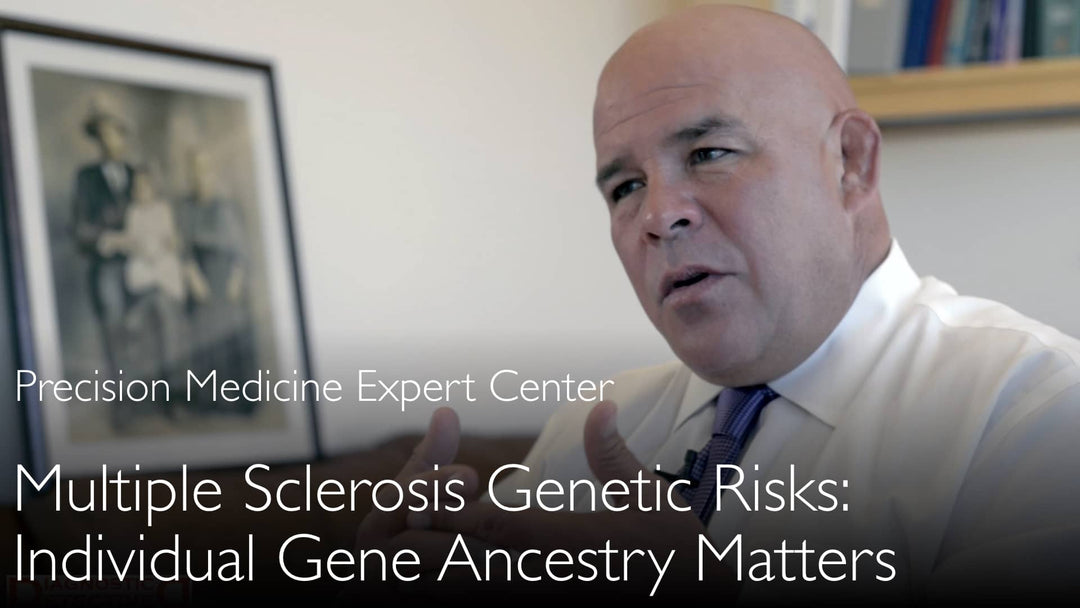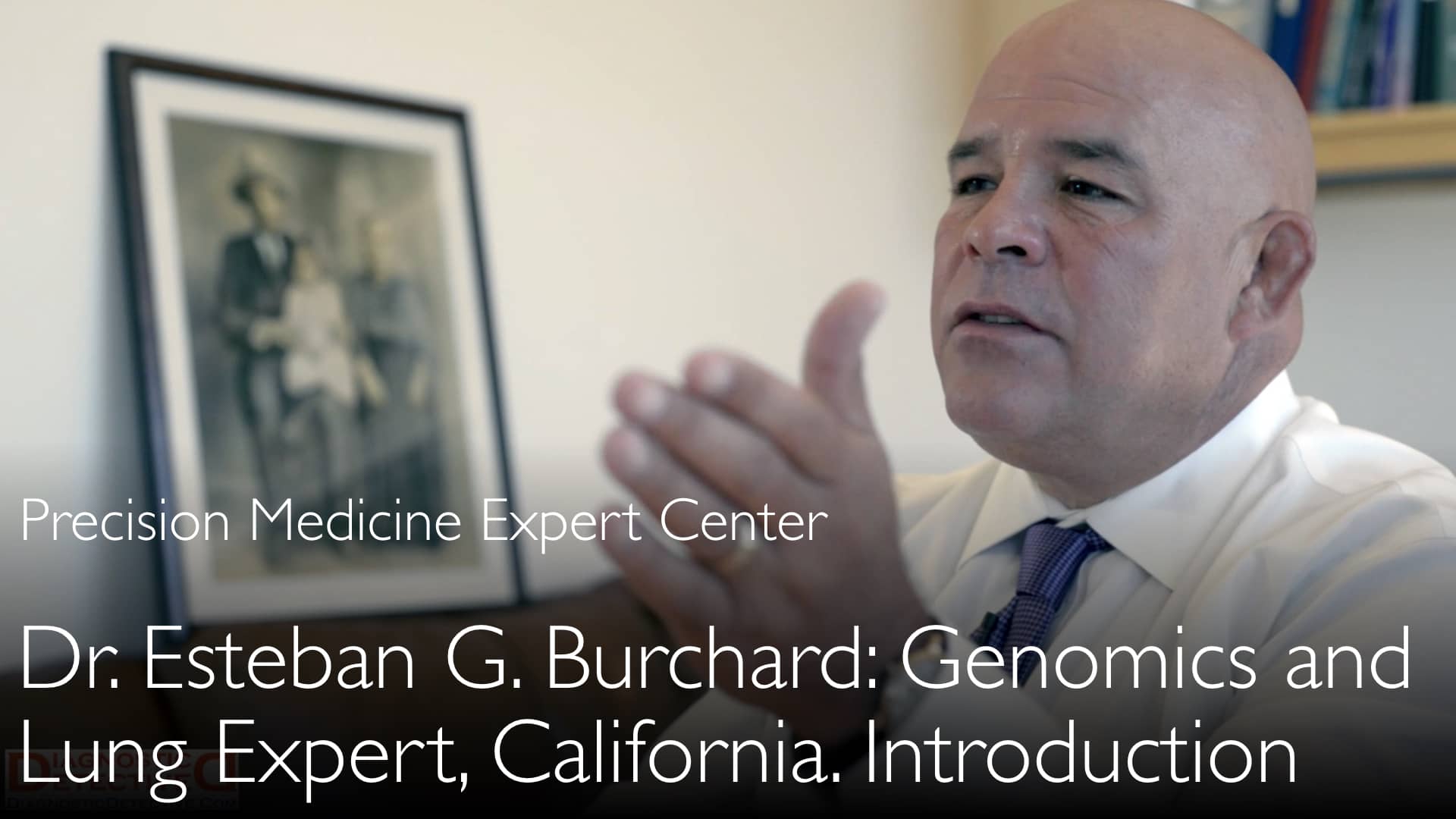O renomado especialista em farmacogenômica e ancestralidade genética, Dr. Esteban Burchard, MD, explica como a ancestralidade genética específica de um indivíduo, analisada no nível do gene — e não apenas sua raça de forma geral —, influencia diretamente o risco de desenvolver esclerose múltipla e a probabilidade de efeitos adversos a medicamentos. Ele destaca um estudo pioneiro com afro-americanos que identificou um fator de risco genético de origem europeia no cromossomo 1.
Ancestralidade Genética e Risco de Esclerose Múltipla: Uma Abordagem de Medicina de Precisão
Navegar para a Seção
- Como a Ancestralidade Genética do DNA Influencia o Risco de Esclerose Múltipla
- A População Afro-Americana na Pesquisa Genética
- O Estudo de Caso de Montel Williams e o Cromossomo 1
- Medicina de Precisão no Diagnóstico de Esclerose Múltipla
- Ancestralidade Genética e Efeitos Colaterais de Medicamentos
- O Papel Crucial de uma Segunda Opinião Médica
- Implicações Futuras para a Pesquisa e Cuidado em Esclerose Múltipla
- Transcrição Completa
Como a Ancestralidade Genética do DNA Influencia o Risco de Esclerose Múltipla
O risco de esclerose múltipla é fortemente influenciado pela ancestralidade genética específica do DNA de uma pessoa no nível dos genes individuais. O Dr. Esteban Burchard, MD, esclarece que, embora a esclerose múltipla seja mais prevalente em indivíduos de ascendência do norte da Europa, o fator crítico é a ancestralidade de genes específicos, e não a identidade racial ou étnica geral da pessoa. Isso significa que alguém de ascendência predominantemente africana ainda pode carregar variantes genéticas europeias que aumentam significativamente sua suscetibilidade a desenvolver essa doença autoimune.
A População Afro-Americana na Pesquisa Genética
O Dr. Esteban Burchard, MD, identifica a população afro-americana como um grupo valioso para estudos de descoberta genética relacionados a condições como a esclerose múltipla. Em média, o genoma de um indivíduo afro-americano é composto por aproximadamente 80% de ancestralidade africana e 20% de ancestralidade europeia no DNA. Essa mistura cria um experimento natural, permitindo que os pesquisadores identifiquem variantes genéticas causadoras de doenças ao analisar especificamente os 20% do genoma com origens europeias, estreitando assim a busca por fatores de risco.
O Estudo de Caso de Montel Williams e o Cromossomo 1
Um estudo pivotal liderado pelo Dr. Stephen Hauser, Presidente de Neurologia da UCSF, ilustra perfeitamente esse conceito. O Dr. Hauser colaborou com o apresentador de televisão afro-americano Montel Williams, que tem esclerose múltipla. Sua pesquisa identificou com sucesso uma região específica no cromossomo 1 que continha genes que aumentam o risco de esclerose múltipla. Crucialmente, como explica o Dr. Esteban Burchard, MD, essa região genética de alto risco foi encontrada com ancestralidade europeia no DNA, fornecendo uma explicação genética clara para a presença da doença no Sr. Williams e em outros pacientes afro-americanos.
Medicina de Precisão no Diagnóstico de Esclerose Múltipla
Esse entendimento avançado move o diagnóstico de esclerose múltipla para o domínio da medicina de precisão. Já não é suficiente considerar apenas os sintomas clínicos; um diagnóstico moderno deve incorporar informações da ancestralidade genética do DNA do paciente no nível do gene. Esse detalhe granular fornece uma imagem mais completa da etiologia da doença e pode ajudar a confirmar um diagnóstico, especialmente em pacientes onde a apresentação pode ser considerada atípica para sua origem racial percebida.
Ancestralidade Genética e Efeitos Colaterais de Medicamentos
A influência da ancestralidade genética vai além do risco da doença e se estende aos resultados do tratamento. A pesquisa do Dr. Burchard em farmacogenômica mostrou que a ancestralidade genética do DNA de uma pessoa pode influenciar diretamente sua probabilidade de experimentar efeitos colaterais graves de medicamentos. Ele cita o exemplo de tratamentos para epilepsia, onde o histórico genético pode prever reações adversas a medicamentos. Esse princípio se aplica igualmente às terapias para esclerose múltipla, ressaltando a necessidade de estratégias de tratamento personalizadas baseadas no perfil genético único do paciente.
O Papel Crucial de uma Segunda Opinião Médica
Buscar uma segunda opinião médica para esclerose múltipla é uma etapa altamente recomendada para garantir que todos os aspectos de um diagnóstico moderno sejam cobertos. O Dr. Anton Titov, MD, enfatiza que uma segunda opinião confirma que o diagnóstico está correto e completo, incluindo uma avaliação de fatores genéticos relevantes. Além disso, é essencial para escolher a melhor estratégia de tratamento personalizado, garantindo que a terapia seja adaptada ao perfil genético específico do indivíduo para maximizar a eficácia e minimizar os possíveis efeitos colaterais.
Implicações Futuras para a Pesquisa e Cuidado em Esclerose Múltipla
O trabalho destacado pelo Dr. Esteban Burchard, MD, tem implicações profundas. A descoberta de genes de risco derivados de europeus em afro-americanos com esclerose múltipla não é importante apenas para essa comunidade; ela aprimora a compreensão geral da doença para todos os pacientes, incluindo aqueles de ascendência europeia. Essa pesquisa abre caminho para um desenvolvimento de medicamentos mais direcionado e reforça que o cuidado clínico futuro deve ser guiado pelos princípios da medicina de precisão que levam em conta a ancestralidade genética individual para melhorar os desfechos dos pacientes.
Transcrição Completa
Os riscos de esclerose múltipla podem ser genéticos. A ancestralidade do DNA no nível do gene individual afeta os riscos de esclerose múltipla. A esclerose múltipla ocorre principalmente em pessoas de ancestralidade do DNA do norte da Europa.
Uma pessoa de ascendência africana pode ter 20% de ancestralidade genética europeia no DNA, que carrega risco de esclerose múltipla. O apresentador de programa de TV afro-americano Montel Williams tem esclerose múltipla. Ele tem ancestralidade europeia no DNA em um gene específico.
Dr. Anton Titov, MD: Fatores de risco genéticos para esclerose múltipla. Mas o risco genético específico para EM (esclerose múltipla) pode estar presente em alguns afro-americanos.
Dr. Esteban Burchard, MD: O apresentador de talk show americano Montel Williams tem esclerose múltipla. Seu fator de risco genético para esclerose múltipla é herdado. Esse gene no cromossomo 1 tem ancestralidade genética europeia no DNA.
Um especialista líder em medicina de precisão explica os riscos genéticos para esclerose múltipla. A ancestralidade genética do DNA no nível do gene individual influencia o risco da doença.
Dr. Esteban Burchard, MD: Entrevista em vídeo com um dos principais especialistas em genética médica e doenças autoimunes. Uma segunda opinião médica confirma que um diagnóstico de esclerose múltipla está correto e completo. Uma segunda opinião médica garante que informações de ancestralidade genética do DNA sejam incluídas no diagnóstico de esclerose múltipla. Uma segunda opinião médica também ajuda a escolher a melhor estratégia de tratamento personalizado para esclerose múltipla.
Procure uma segunda opinião médica sobre esclerose múltipla e tenha confiança de que seu tratamento de medicina de precisão é o melhor.
Dr. Anton Titov, MD: Fatores de risco genéticos para esclerose múltipla. Quais são exemplos de ancestralidade genética individual do DNA? Como a ancestralidade do DNA influencia o risco de desenvolver esclerose múltipla? Como a ancestralidade genética do DNA influencia a probabilidade de ter efeitos colaterais de medicamentos?
Sua pesquisa mostra que a ancestralidade genética do DNA de uma pessoa influencia o risco de desenvolver esclerose múltipla. A ancestralidade do DNA influencia a probabilidade de efeitos colaterais graves de medicamentos para tratamento de epilepsia. Por favor, fale sobre isso.
Dr. Esteban Burchard, MD: O artigo científico sobre esclerose múltipla não foi nosso trabalho, mas é uma bela ilustração de pesquisa em populações racialmente mistas. A esclerose múltipla é principalmente uma doença de norte-europeus, mas também sabemos que afro-americanos às vezes desenvolvem esclerose múltipla.
Você é um pesquisador genético. A melhor população para encontrar um gene de esclerose múltipla é a população afro-americana. Porque sabemos que, em média, os genes de afro-americanos são 80% de descendência africana e 20% de descendência europeia. Portanto, você tem que olhar para 20% do genoma, que é de origem europeia no DNA.
O Dr. Stephen Hauser é o Presidente do Departamento de Neurologia da UCSF. Ele veio para São Francisco do Massachusetts General Hospital em Boston. O Dr. Hauser teve uma ideia brilhante para um ensaio clínico com afro-americanos com esclerose múltipla. Ele se conectou com Montel Williams, um popular apresentador de talk show nos Estados Unidos. O Sr. Williams é afro-americano e tem esclerose múltipla.
Eles encontraram uma região no cromossomo 1 que contém genes que aumentam o risco para esclerose múltipla. Esses genes têm ancestralidade europeia no DNA. Este ensaio clínico é importante para afro-americanos e também para todos os pacientes com esclerose múltipla, incluindo pacientes com EM de ancestralidade europeia no DNA.
Este ensaio clínico melhora nossa compreensão da esclerose múltipla. Fatores de risco genéticos para esclerose múltipla. Como a ancestralidade do DNA do gene individual influencia o risco de esclerose múltipla. Medicina de precisão em esclerose múltipla.





